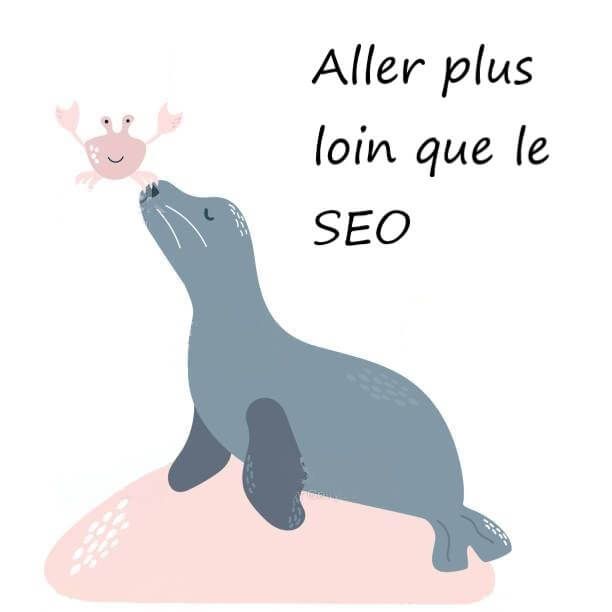Off-page SEO
Definition and Netlinking strategies
Off-page SEO, the third pillar of natural referencing
Much more than just technical optimization, off-page SEO aims to strengthen the reputation and authority of your site on the web.
Off-page SEO, what are we talking about?

Off-page SEO encompasses all activities carried out outside of your website that influence its visibility on search engines.
Unlike the
On-page SEO, which focuses on internal optimization, off-page SEO explores links from other sites, social interactions, and other external factors that help build your website's authority and reputation.
Why is Off-page SEO important?
Off-page SEO doesn’t just improve your positioning in search results. It also helps establish your credibility, your notoriety and the online influence of your company. A complete SEO strategy must therefore include efforts dedicated to netlinking to ensure your sustainable online presence.
Netlinking, an essential practice
Netlinking, also called
link building
, is an essential practice in SEO.
It involves getting links (hyperlinks) from other websites to yours, indicating to search engines that your site is relevant, trustworthy and worthy of interest.
Netlinking is an aspect of off-page SEO. It aims to strengthen the popularity and authority of your site on the web.
The underlying idea is that
the more quality links your site receives
from reputable and relevant sites (i.e. related to your topic or sector of activity), the more it benefits from a
higher ranking in search results
.
It is important to note that the
quality of links is crucial
. Links from trusted and relevant sites have a greater impact on ranking than links from untrustworthy or irrelevant sites.
Penguin Algorithm
Netlinking practices must respect the guidelines of search engines for avoid possible penalties .
Penguin algorithm was introduced to combat unnatural, manipulative link building practices and abuses aimed at artificially improving a site's ranking in search results.
An "ethical" and well-planned netlinking strategy can play a vital role in the long-term success of your SEO strategy.
How to avoid Google penalties?
To avoid Google penalties, follow ethical link building practices. Avoid manipulation, artificial links, and make sure your links are relevant and natural.
Following Google's quality guidelines and regularly monitoring the health of your links helps prevent potential penalties.
What are the goals of off-page SEO?
The goals of off-page SEO are multiple. Beyond improving your search engine ranking, it aims to increase your site's awareness, establish your online credibility, and strengthen your domain's authority.
Building a quality web of links, participating in online communities, and other strategies help expand your digital footprint and create a robust web presence.
Link Building Strategies
Link building is a major pillar in SEO. To get quality links, it is essential to create quality content.
Partnering with other sites, creating guest content, and participating in quality directories are all effective strategies. The goal is to foster organic, relevant links that build your site's authority.
How to get inbound links?
Getting inbound links requires a proactive approach. Identify relevant sites in your niche, establish partnerships, and provide valuable content to share. Social media mentions and forum participation can also generate organic links. The key is to create compelling content that encourages others on the web to share it spontaneously.
How to buy links in netlinking?
Set your goals
What do you want to accomplish with your link building campaign? Do you want to increase traffic to your website, improve your search engine rankings, or generate leads? Once you know what you want to accomplish, you can start looking for links that will help you achieve your goals.
Do your research
There are many ways to find links to buy. You can use link search tools, link directories, or discussion forums. You can also contact website owners directly and ask if they would be interested in selling links.
Rate the links
Once you have found a few potential links, you need to evaluate them to make sure they are of good quality. Consider the following factors:
- Domain Authority
Domain authority is a measure of a website’s popularity and trust. A website with a high domain authority is more likely to pass link juice to your website.
- Website traffic
Website traffic is a measure of how many people visit a website each month. A website with high traffic is more likely to send visitors to your website.
- The relevance of the website
Website relevance is a measure of how relevant a website is to your website. A relevant website is more likely to send interested visitors to your website.
Buy the links
The price of a link varies depending on the quality of the link, the website traffic and the relevance of the website. You can usually buy links through a link network or a netlinking platform (Linkuma, Semjuice, Boosterlinks, seoforall , Bulldoz, Ereferer, etc.
Monitor the links. Once you have purchased the links, you need to monitor them to make sure they are still active and sending traffic to your website.
You can use link monitoring tools like Majestic, Semrush, Seranking).
Benefits of Choosing an SEO Consultant
Hire a SEO consultant specializing in off-page SEOpresents several significant advantages for a business looking to improve its online visibility and optimize its website.
Here are some of the main benefits:
- Specialized expertise:
an on-page SEO consultant has in-depth expertise in SEO best practices and the latest trends.
He is able to implement effective strategies to optimize every aspect of your website according to the requirements of search engines. - In-depth analysis: an SEO consultant performs an in-depth analysis of your website, including its content, structure, links, metadata, and other aspects. This analysis helps identify areas for improvement to achieve better rankings in search results.
- Personalized strategies:
every website is unique, and an on-page SEO consultant develops customized strategies based on the specific needs of your business. This includes identifying relevant keywords, optimizing your content by implementing an
editorial strategy, internal and external link management, and other techniques specific to your field of activity.
- Performance monitoring: monitoring your website's performance, using analytical tools to measure the impact of changes made, helps adjust ongoing strategies and maximize results.
- Time savings: By outsourcing on-page SEO management to a consultant, you allow your team to focus on other critical aspects of your business. This can save you time and resources, while ensuring optimal management of your online presence.
An SEO consultant stays informed of the latest changes and adjusts strategies accordingly to ensure continued performance and rankings.
Finally, if your business targets a local audience, an SEO consultant can implement
local SEO strategies
Improve your netlinking with an SEO consultant
Contact
Do you have a question? Send your message!





